BY JEFFREY RESSNER
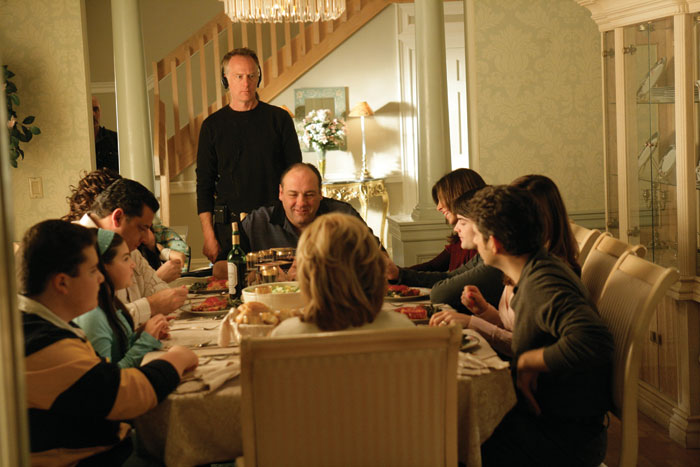 CIAO, TONY: Alan Taylor, directing what looks like one big, happy American
CIAO, TONY: Alan Taylor, directing what looks like one big, happy American
family, brought a cinematic quality to The Sopranos. (Credit: Craig Blankenhorn)
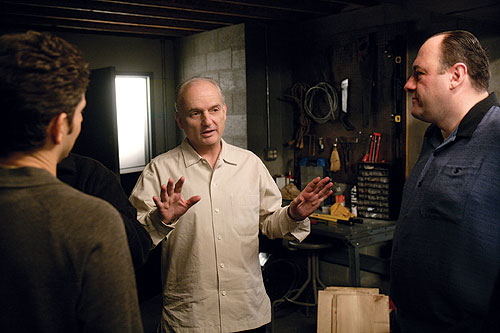
TOP GUN: The series was the vision of director David Chase (center), here
with Michael Imperioli (left) and James Gandolfini.
It was eight years ago that The Sopranos' pilot episode opened with mob kingpin Tony Soprano fainting and, after being diagnosed with panic attacks, telling his new therapist about ducks swimming in his backyard pool. Since then, countless people have been whacked, expletives uttered and pasta eaten. Widely acknowledged as the best dramatic series of the last decade, and perhaps ever, the brilliant cast—James Gandolfini as Tony, Edie Falco as his wife Carmela, and wiseguys Michael Imperioli, Tony Sirico and Steve van Zandt—have become as familiar as, God forbid, family. Then there's the amazing writing and production team, led by the show's creator and capo di tutti capi David Chase. While Chase and the actors have been deservedly praised and repeatedly reaped the respect of their peers, the press, and an adoring public, the directors' contributions have been so consistent and at such a high level that they have sometimes gone unnoticed.
An exclusive club of goodfellas, the directors could be the real unsung heroes of The Sopranos. David Chase, inspired as a youth—or "yoot," in Tony's vernacular—by Arthur Penn's Bonnie and Clyde and other crime classics, conceived and directed the pilot and continues as the guiding force, overseeing storylines, musical scores and every single word spoken on screen. He is also directing the finale, which will close out his epic tale of crime and punishment this summer. In between, he has entrusted his noble creation to an eclectic band of skilled craftsmen, each with a different style and background. Some are dynamic realists, others expert at composition, still others lyrically visual poets. As the series comes to an end, we give credit due to the directors who helped create this unique universe.
Tim Van Patten: Born into a sitcom acting clan, his showbiz debut was portraying "Salami" on the 1970s drama The White Shadow and he later directed Touched by an Angel—not exactly hard, edgy stuff. Still, with 17 Sopranos episodes to his credit, and three more to come this season, he's the most prolific director of the entire series. "Anyone who's stood on the floor of a set knows nothing gets done by itself," Van Patten says. "But on this show it's harder—the bar is raised so high that you'd better be in the game, because if you're just sitting on the sidelines and letting things happen, chances are you won't be called back."
Allen Coulter: Another Sex in the City vet, Coulter made his bones in sci-fi shows including The X-Files, and recently directed his first feature, Hollywoodland. "In general, television directors are the most overlooked entity in the creative process," he says. "They're considered a necessary encumbrance who are there to either play out the writer-producer's ideas or to somehow muck them up. But David is respectful of directors. Even though he has a very strong vision, he's given us great freedom and encouraged us."
Alan Taylor: An NYU film major who studied with Martin Scorsese, Taylor debuted with Palookaville, a well-received indie feature about small-time Jersey City crooks, then directed episodes of Homicide, Oz and Sex and the City. "A lot of television has been reduced to just covering the dialogue in close-ups," he says. "David wanted The Sopranos to be cinematic, and the pilot's elements are still the basic look of the show: wider lenses and brooding qualities of light, allowing things to fall off into the darkness. Perhaps it's a bit less stylized now, but the composition remains forceful and there's an iconic power to the imagery."
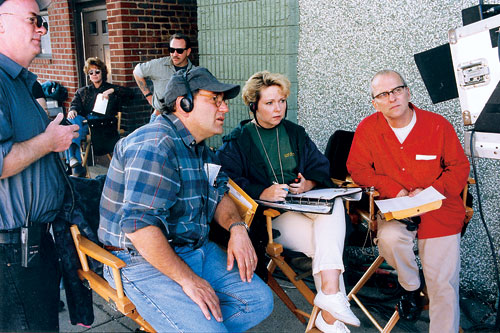 Henry Bronchtein (left) watching playback.
Henry Bronchtein (left) watching playback.
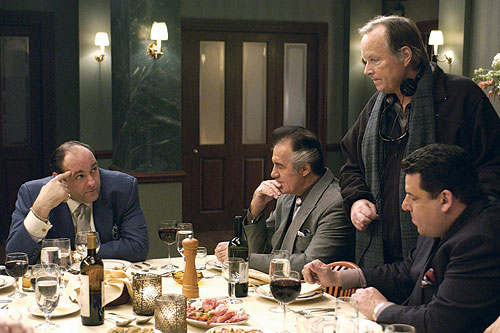
The late John Patterson directs James Gandolfini, Tony Sirico and Steven Schrippa.
(Credit: Abbot Genser)
Henry Bronchtein: Starting as a DGA trainee on Raging Bull, he was 1st AD on The Sopranos pilot, soon becoming unit production manager and eventually producing and directing episodes as well. "When you're directing, you need to focus on shots and performances and let others worry about the production end," he has said of his multitasking. "David leaves directors pretty much alone to plan how they're going to shoot and get their points across... There's also an enthusiasm among the crew. You know, sometimes you'll get suggestions from the dolly grip for a great shot. They're definitely into the show."
Much respect is also due to the late John Patterson, a former B-52 bombardier with the Strategic Air Command who exuded Zen-like calm behind the camera. "He directed without any anxiety whatsoever," recalls Van Patten. "He was instinctual, very finely attuned to the stories and performances—if, on the spot, he was pressed for time, six shots could become one shot at a moment's notice." A workaday TV helmer for decades, Patterson shot one or two episodes on dozens of hit series including CHiPs, L.A. Law and Magnum, P.I. before reuniting with his old Stanford classmate (and Rockford Files alumni) Chase. After directing 13 Sopranos episodes, Patterson died from cancer in 2005. In many ways, his loss dealt as strong a blow as the death of Nancy Marchand, who had played Tony Soprano's manipulative mother in the first two seasons. "John was subtle and expert in every way," Chase told the Los Angeles Times shortly after his friend's passing. "They called him 'the Dutch master,' even though he wasn't Dutch."
The list doesn't end with those five. Jack Bender and Dan Attias have directed multiple episodes and also contributed to the overall work, as did single-episode artists including Mike Figgis, Lee Tamahori and Danny Leiner. Each is important in their own right since, as one director put it, The Sopranos isn't about making 13 episodes per season—it's more like one 13-hour movie every year.
"I never wanted to create a television series," Chase admitted when he received the DGA Honors in 2006. "All I wanted was a piece of film to show as a director to propel me into the world of feature films [and] the pilot of The Sopranos was supposed to do that... Episodic directors really seldom get the credit they deserve but these people came in after the pilot, took the style that had been laid down there and proceeded to trash and ignore it. With great results... They all wanted to create something different and to bring to TV at least something of what we'd all seen in the films of people like Arthur Penn and Martin Scorsese, Stanley Kubrick and Peter Bogdanovich, all the great film directors."
The reference to Bogdanovich wasn't gratuitous. Aside from introducing Chase at the Honors ceremony, the veteran director has been a Sopranos staple since season two, appearing in about a dozen episodes as psychiatrist Dr. Elliott Kupferberg, and going behind the camera for a 2004 show titled "Sentimental Education." Handling a Sopranos hour "isn't even remotely the same" as doing a feature, says Bogdanovich, because "you're in the service of an ongoing work that's very well thought out and established. The writing is of such high quality and the actors all know what they're doing."
Like every other Sopranos director, Bogdanovich dealt with Chase and the creative team during critical pre-production meetings on each episode's style and tone. Taking place in the first week of prep, the intense tone meetings—which Patterson used to call "defending your life"—are key in making sure the director's vision dovetails with Chase's own. "Even after doing 21 or 22 of these, I still feel on edge before I go into a tone meeting," says Van Patten.
The lines are well delineated. Chase gives directors freedom with camera placement, working with actors and the first edit, but he must be consulted on every line change, enforces strict rules about Tony's therapy sessions, commands final cut, and insists upon making all song choices as he revels in playing DJ for each show. "You have enormous input in the casting of day players, though David makes the final decision," adds Coulter. "You also have control about how you stage and block scenes, thematic qualities you want to infuse the episode with to a degree, the locations to a degree." Bogdanovich says Chase requires lots of coverage, too, because he'll often continue to write a show after it's been shot, calling for reshoots or occasionally even transposing a scene from one script into a different episode.
Aside from Bogdanovich, the only other Sopranos director-actor double threat is indie stalwart Steve Buscemi. Turns out Chase was a big fan of his feature directorial debut, the boozy black comedy Trees Lounge. So, long before appearing on camera as Tony's quirky ex-con cousin, Buscemi directed season three's superb Sopranos episode, "Pine Barrens," in which Tony's nephew Christopher and sotto capo Paulie Walnuts (Tony Sirico) get lost in a frozen forest after fumbling a hit on a Russian mobster.
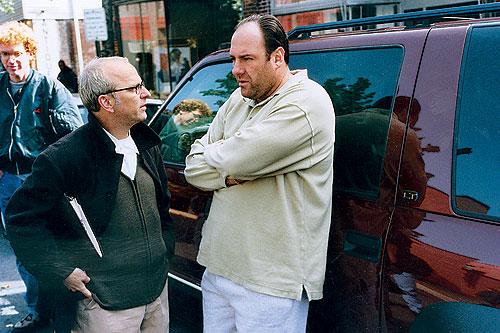 Allen Coulter with actor James Gandolfini.
Allen Coulter with actor James Gandolfini.
Van Patten wrote "Pine Barrens"—his only teleplay for the series—after dreaming about the mysterious New Jersey woods he visited as a child when his father took him to Atlantic City. "We don't walk on tiptoes around David, but you don't just bore him with some story like that," says the director. "So I pitched it to him briefly, and he looked up and said, 'Done!'"
Buscemi, who recently directed his fourth feature film, believes his responsibility on The Sopranos is to deliver "what David expects." Though the show's characters are firmly entrenched and fully developed, he considers working closely with the players his strongest suit. "Actors still want to be directed," he says. "There's a read-through, but the drawback is we don't get a chance to rehearse. Still, there's lots of communication on the set and before we ever get there so we're not wasting time."
Even a seasoned performer like Buscemi was a bit cowed at first working with such iconic characters. "It took awhile to get up to speed," he admits with a nervous laugh. "Even though I felt incredible support, it was intimidating coming into a show where the characters are so familiar and the director is the new guy on the set. It was pretty daunting."
Buscemi's eyes bugged out more than usual during his first day directing, and he became especially skittish approaching the hulking Gandolfini. "The first scene I directed was with Jimmy and I had never worked with him before," he recalls. "He plays his part so well that it's kind of intimidating to go up to him—you feel like you're talking to Tony Soprano. He was warm and gracious, but I was so used to seeing the show as a finished product that it was a surreal experience."
Those were the early days—Buscemi's first episode of the four he directed aired in May 2001. It was a more innocent time, when the show was first finding itself. "The first season was different because we were collaborating in creating a world you haven't seen," says Taylor. "The show hadn't become part of the popular culture yet, so we did it from scratch."
Coulter draws a literary analogy for the launch. "It was a bit like working at the theatre where a young Tennessee Williams was writing plays," he says. "You felt you were working on something exceptional that no one else knew about. The show had not quite found itself as a total series, so David felt very free because there was no assurance there'd ever be a second season. The first season was like the best summer job I ever had. The second was harder because we went from being unknown to being anointed as 'Important.' There were pressures on the set, a background radiation of tension that permeated everything. Thankfully, by the fifth season it had hit a certain groove."
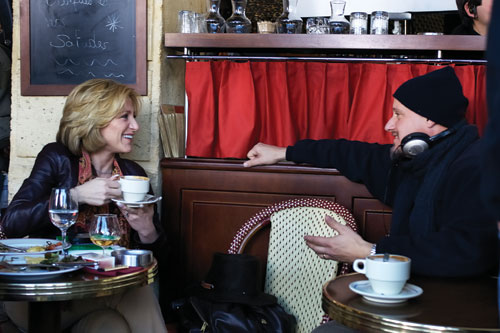 Tim Van Patten directing Edie Falco. He has directed more
Tim Van Patten directing Edie Falco. He has directed more
episodes than anyone else. (Credit: Jacques Le Goff/HBO)
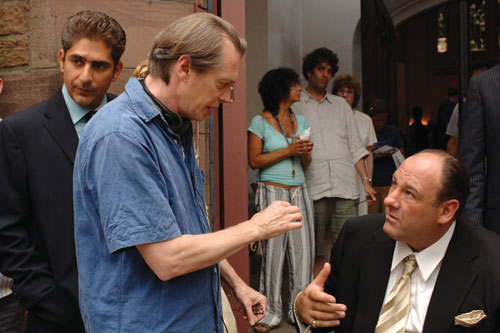
At first, Steve Buscemi found it daunting to direct such iconic characters.
(Credit: Barry Wetcher/HBO)
Much more changed over the years from a directing standpoint, not least of which were the schedules and budgets. "Production values skyrocketed," adds Taylor, taking a break from directing a final season episode. "We have 19 days to shoot this new episode—my first took nine or 10. We're spending two or three days on one character getting whacked, we shut down a highway—things we didn't have the power or money or time to do in the first season now seem routine."
Some things, of course, never changed. After the first season, Chase would rarely visit the sets after the tone meeting, leaving directors to do their own thing. But he's always been available if there's a burning question. Taylor, Coulter and others occasionally drop by his office in the Queens warehouse where much of the show is shot, rather than ringing his cell phone. A personal touch was always preferred over e-mail as well. "I don't think David even knows what a BlackBerry is," says Van Patten with a laugh.
Another constant over the years has been abiding by a code of silence, keeping upcoming storylines and various plot twists from the outside world. False scripts have been distributed and fake scenes shot to protect against informants who might squeal. "I came by to visit one season when Tim Van Patten was filming the episode where Adriana (Drea de Matteo) got killed," says Alan Taylor. "He wouldn't even tell me what happened. Apparently, only three people knew and they had an alternate scene planned just to throw the crew off the scent. We're very serious about it."
Serious, yes, but also seriously overlooked in many quarters. Chase certainly spun The Sopranos' epic tale and great actors breathed life into the words on the page. But The Sopranos' directors—like so many of their television kinsmen—sometimes seemed to get as much respect from the press as Rodney Dangerfield. Of course, the directors have taken the center stage at the DGA Awards: series directors have been nominated eight times, with Chase and Patterson winning in 2000 and 2003, respectively.
Surprisingly, none of the show's directors has been bestowed with an Emmy, though producers, writers, cast members, makeup artists, casting executives and an editor have been so honored. "In general, the director is not the star of the show in television," says Taylor. "On The Sopranos, it's less so because of the strong mystique, feel and tone—I think it's understood that there's a directorial hand in that. The only time I get slighted is when my mother gets upset after she reads something about the show and doesn't see my name in the article." Mrs. Taylor won't have to worry this time.